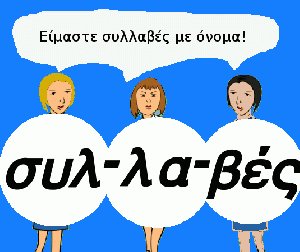Difference between revisions of "Language/Modern-greek-1453/Grammar/Syllabification"
| Line 49: | Line 49: | ||
*άν-θρω-πος | *άν-θρω-πος | ||
*Νο-έμ-βρι-ος | *Νο-έμ-βρι-ος | ||
===Diphthong | ===Diphthong, conjonctions, double consonants...=== | ||
The diphthongs (αι, ει, οι, ου, υι), the conjonctions (αυ και ευ), the double consonants (μπ, ντ, γκ, τα, τζ), the double vowels (αη, οη, άι, όι) and the abused diphthongs (ια, ιο, ιου, ειος, εια, ειο, οιος, οια, οιο, υα, υου) are not separated. | The diphthongs (αι, ει, οι, ου, υι), the conjonctions (αυ και ευ), the double consonants (μπ, ντ, γκ, τα, τζ), the double vowels (αη, οη, άι, όι) and the abused diphthongs (ια, ιο, ιου, ειος, εια, ειο, οιος, οια, οιο, υα, υου) are not separated. | ||
*παι-δεί-α, ναυ-τι-κό, τα-μπέ-λα, κε-λαη-δά, κά-ποιος, λα-λιά, γυά-λα, στα-χυού | *παι-δεί-α, ναυ-τι-κό, τα-μπέ-λα, κε-λαη-δά, κά-ποιος, λα-λιά, γυά-λα, στα-χυού | ||
Revision as of 11:38, 7 August 2018
Each word is composed of several parts, the syllables
- Example: πα–τέ-ρας (the father)
The separation of a word into syllables is called spelling.
Spelling rules
A vowel is a syllable
A vowel may be just a syllable in a word:
- ά-νε- μος (wind)
- γρα-φεί-ο (office)
Two consecutive vowels
Two consecutive vowels are separated:
- π.χ. α-ε-τός (eagle)
- ή-ρω-ας (heros)
A consonant between two vowels
A consonant being between two vowels goes with the second vowel:
- α-γά-πη (love)
- έ-χω (to have )
Two identical consonants
Two identical consonants are separated:
- κόκ-κι-νο (red)
- μέ-λισ-σα (bee)
Two consonants are not separated if...
Two consonants are not separated if they begin with a Greek word:
- έ-πι-πλο (furniture)
- ά-στε-ρι (star)
Two consonants are separated if...
But if they do not begin with a Greek word then they are separated:
- πόρ- τα, (door)
- στιγ-μή (dot)
3 consonants in a sequence
The same happens when we have 3 consonants in a sequence. They are not separated when a Greek word begins from the first two.
- α- στρα-πή (thunder)
- ε-χθρός (enemy)
- στρα-τός (army)
- χθ εσινός (previous)
No Greek word starts from the first two consonants
But if no Greek word starts from the first two consonants, they are separated
- άν-θρω-πος
- Νο-έμ-βρι-ος
Diphthong, conjonctions, double consonants...
The diphthongs (αι, ει, οι, ου, υι), the conjonctions (αυ και ευ), the double consonants (μπ, ντ, γκ, τα, τζ), the double vowels (αη, οη, άι, όι) and the abused diphthongs (ια, ιο, ιου, ειος, εια, ειο, οιος, οια, οιο, υα, υου) are not separated.
- παι-δεί-α, ναυ-τι-κό, τα-μπέ-λα, κε-λαη-δά, κά-ποιος, λα-λιά, γυά-λα, στα-χυού
les mots composés sont divisés en ses éléments
- κα-τέ-χω, ε-πί-λο-γος
Name of words (depending on the number of syllables)
monosyllables (1 syllable)
- και, με, ναι
dissyllables (2 syllables)
- ό-χι,(no) μέ-σα, (in) πι-κρός (bitter)
trisyllables (3 syllables)
- κα-ρέ-κλα, (chair) γρα-φεί-ο (office)
polysyllabes (more than syllables)
- πο-δή-λα- το (bike) φω-το-γρα-φεί-ο (photograph)
Syllables names
The last syllable of a word is called an ending
- τι-μή (honor)
The penultimate syllable is said to be conceding.
- με – λέ – τη (study)
The third syllable from the end is said to be a prelude.
- άν-θρω- πος (man)
The first syllable of a word is called the original syllable
- κα-ρα-μέ-λα
No multi-word word is emphasized above the foreword!
- οι-κό-πε-δο (field)
